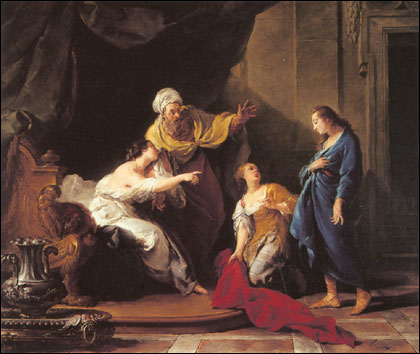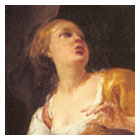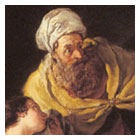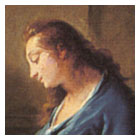




French, 1711-81
Joseph Accused by Potiphar's Wife, circa 1740ľ44
Oil on canvas
NoŰl HallÚ's Joseph Accused by Potiphar's Wife results from a mid-eighteenth-century academic revival of the genre so closely linked to tragedy, history painting. In accordance with the rules of the art, HallÚ has depicted the climactic scene in which a dramatic change of fortune strikes the hero, Joseph. This explains why HallÚ has chosen not the more frequently depicted scene in which Potiphar's wife attempts to seduce Joseph, but instead the later moment when she falsely accuses Joseph of seducing her; it is this second moment that seals the unhappy fate of the hero, who is sentenced to years in the dungeon.
HallÚ here not only showed the influence of French classical biblical tragedies, but also flirted with echoes of secular tragedy, particularly that of Hippolytus, similarly libeled by Theseus' wife, Phaedra (or, in the Racine version, by her nurse, Oenone). As in de La Hyre's Panthea, the essential elements of a theatrical production are spectacularly manifest in HallÚ's composition. In a perfect reflection of the stage, the painting again represents four characters intensely interacting in an intimate space: the wife and her servant (here holding up Joseph's robe as evidence to corroborate her mistress), Potiphar in shock at hearing the accusation, and Joseph, bearing the calumny with a rhetorical display of equanimity and submission worthy of the finest trained actor.